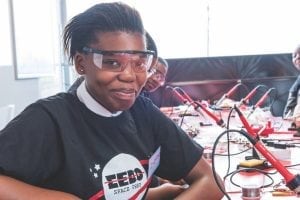Latest News
[Via Satellite 12-08-2016] The Cape Town-based Meta Economic Development Organization (MEDO) has bought the first privately owned satellite in Africa, and perhaps more remarkably, the company is teaching teenage girls to build and analyze the data coming off of the spacecraft.
In partnership with a program at Morehead State University (MSU), satellite engineers from Cape Peninsula University of Technology are training 14 teenage girls in building a cubesat. In orbit for six to eight weeks, the 1U satellite will aim to collect data on floods and droughts across the continent, as well as awaken an interest in Science, Technology, Engineering and Mathematics (STEM) in the students involved — a concept developed and carried out by the young women themselves.
“The satellite will be fitted with a multi-spectral camera so it can collect images of crops, fields, etc., and provide information to farmers who can use the data to improve the quality and production of their crops,” said Ben Dixon, technology lead at MEDO. “And because it already has that camera onboard, it can be used for disaster management to detect forest fires and floods.”
The organization will also look to collect data on its re-entry into the atmosphere that Dixon believes can be analyzed to understand the de-orbiting process and possibly aid in the future removal of space debris, another goal for the program.
Scheduled to launch into 310-kilometer polar orbit in May 2017, MEDO set out to purchase the launch slot and satellite kit in 2014 and has been working with young women to design, build and test the satellite over the last year.
“We are dealing with young women who have been let down a lot. They come from very underprivileged communities. They have been let down by society. They have overcome a lot already, and we are not going to let them down. So we wanted to make sure we had everything in place for the launch before pursuing the program. We wanted to make sure that we can deliver,” Julie Sandrock, co-founder and joint CEO of MEDO, told Via Satellite.
The organization purchased its seat on a launch manifest from Interorbital Systems, a launch company operating out of the Mojave Spaceport, but also purchased pocket cube and cubesat launchers from MSU as a “back-up plan.”
It was only after they had set out on the program when the company realized they would be launching the first privately owned satellite in Africa.
The organization alongside MSU began running workshops from summer 2015, training the young women in soldering and putting together “jiggy bots,” tiny robots whose movements can be controlled. After running several workshops exploring the building and launch of satellites, however, the program felt that it needed to change direction in order to see a real impact.
“We felt that we were engaging these young women in STEM, the response we had was fantastic from both the girls and their parents, but our concern was that we were soldering, and it was analog. We felt that we didn’t want to train techniques that were, in fact, obsolete,” said Sandrock. “We want to equip these young women for careers, so it has to be digital. It has to be solder-free.”
The organization made a shift and began working on their own tech development, introducing modular technology that instead allowed the girls to work with software instead of the hardware. This entails teaching the young women to collect and analyze big data and more practical skills such as coding.
“We are finding that we are able to impact very realistic, empowering skills for the future to these young women,” said Sandrock.
This shift also allowed the company to scale its impact dramatically where more expensive, soldering-based workshops were limiting impact.
“If we consider that we’ve got a massive hill to climb in Africa when it comes to this program we have to impact thousands of people a year, not tens of people or even hundreds of people, so we had to be able to scale up,” said Sandrock, noting that the company moved from 14 girls in the first workshop to 153 one year later by shifting focus to digital skills.
Beyond the 2017 launch, MEDO has scheduled launches through 2024 and is looking to continue scaling up the program to introduce it to thousands of students across South Africa.
In kickstarting the interest in STEM, the organization is also hoping for a longer-term impact that will in-turn jumpstart the African space industry at large.
“The longer-term goal is to develop the space industry in South Africa and across the continent. Africa has only developed and launched about 16 satellites, so our long-term plan is to get launch capabilities back up and running in South Africa,” said Dixon, who notes that political instability had destabilized and essentially shut down the space industry. “With this program we’d like to feed the industry and spark the interest in the space industry to get back to where we were a few decades ago.”
Get the latest Via Satellite news!
Subscribe Now